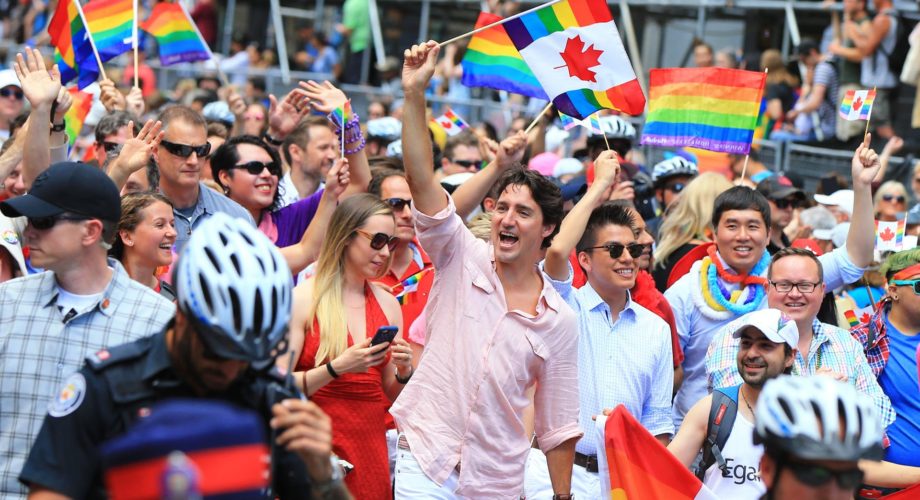
Justin Trudeau, the Canadian prime minister, marches in the 2016 Pride Toronto event.
Toronto’s police force has withdrawn its application to march in the city’s Pride parade after organisers highlighted perceived failures by the force to properly investigate crimes against the LGBT community.
The organisers of Canada’s largest Pride event had asked Toronto police to withdraw their application to join June’s parade.
In January the force charged Bruce McArthur with six counts of first-degree murder, months after Toronto’s LGBT community began voicing concerns that aserial killer was targeting men in the city’s Gay Village. Hundreds of missing persons cases are now being re-examined.
As recently as December the force had said there was “no evidence” of a serial killer in the Village – a denial that further damaged the already fragile relationship between the Toronto LGBT community and the force.
“This has severely shaken our community’s already often tenuous trust in the city’s law enforcement. We feel more vulnerable than ever,” said Pride Toronto in a statement posted to Facebook and Twitter this week. The statement was signed by Pride Toronto’s executive director, Olivia Nuamah, and a number of advocacy groups around the city.
“Marching won’t contribute towards solving these issues; they are beyond the reach of symbolic gestures,” the statement added.
Mark Saunders, the Toronto police chief, said on Tuesday the force was listening to the LGBT community. “I will be withdrawing the application we have made to the organising committee of the Pride parade,” he said. “My hope is that this move will be received as a concrete example of the fact that I am listening closely to the community’s concerns.”
The city’s annual Pride parade, one of the largest in the world, can trace its origins to raids on four gay bathhouses in 1981, known as Operation Soap, in which Toronto police arrested more than 300 people.
Tensions between the LGBT community and Toronto police have continued ever since. In 2016, activists from Black Lives Matter staged a sit-in protest against harassment by police and racism in the broader LGBT community. One of their requests during in the sit-in, that police not march in the parade in uniform, was honoured the following year amid opposition at City Hall.
Toronto was rocked by the news this year that police had charged McArthur with six counts of first-degree murder in connection with the deaths of of Majeed Kayhan, Soroush Mahmudi, Dean Lisowick, Selim Esen, Andrew Kinsman, Skandaraj Navaratnam and a seventh, unidentified male. McArthur has not yet entered a plea.
Many community members had previously expressed frustration that not enough was being done to investigate the disappearances of the men. The community was angered further when Saunders told the Globe and Mail’s editorial board that the killer might have been caught sooner had more community members come forward with tips.
Before charges were announced against McArthur in January, it appeared Toronto police and Pride organisers were close to reaching an agreement for the force to attend the 2018 parade. The office of John Tory, the mayor of Toronto, did not respond to a request for comment on the most recent developments.
The LGBT community is also grappling with the recent deaths of Alloura Wells, a trans woman whose death remains unsolved, and Tess Richey, who was killed in the Gay Village over the summer.
“We will come together, as we have for decades, and we will be seen. We will rally and rise but it will be with heavy hearts as we have not yet begun to grapple with our anger, shock and grief,” said the Pride Toronto statement.
The organisers called for “focus on deeper dialogue, collaborative action and sustained institutional change. Only a significant commitment and meaningful action can start the critical work of making our communities safer.”